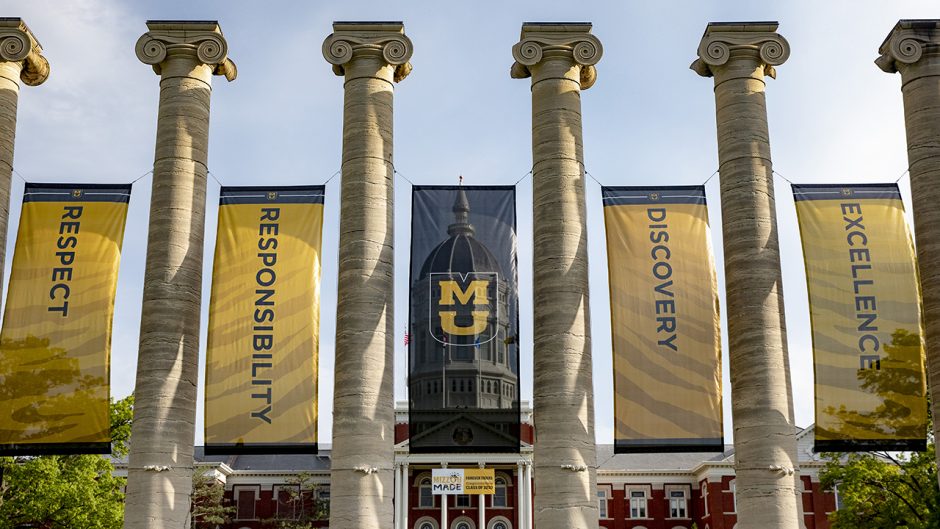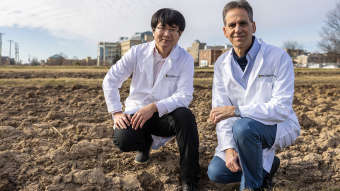
May 4, 2022
Contact: Sara Diedrich, 573-882-3243, diedrichs@missouri.edu
The University of Missouri will soon celebrate the accomplishments of 5,828 students with more than 6,360 degrees at MU’s spring commencement ceremonies. University officials also will honor Amy B. Heimberger, a world-renowned neurosurgeon, and John Rogers, a highly accomplished biomedical engineer, with honorary degrees, the highest honor the university awards.
“There are so many outstanding achievements among our graduates, and the University of Missouri is excited to celebrate them alongside their friends and family,” said Mun Choi, president of the University of Missouri. “We are confident that these graduates, with all that they’ve learned and experienced at Mizzou, will be impactful leaders in the next step of their journey. We are proud of each and every one of our graduates. We can’t wait to see what they achieve in the future.”
Of the 6,364 degrees MU is awarding during commencement weekend, 4,441 of them will be bachelor’s degrees, 1,147 will be master’s degrees and 322 will be doctorate degrees. There also will be 85 law degrees, 38 education specialist degrees, 115 veterinary medicine degrees, 110 medical degrees and 106 professional degrees awarded. Some students will receive more than one degree.
In all, students from the graduating class hail from 50 states and 45 countries. There are 959 online students in the Class of 2022.
“No matter where our graduating Tigers go next, we know they bring with them skills from a world class education at Mizzou,” said Latha Ramchand, provost and executive vice chancellor for academic affairs.
Heimberger, a neurosurgeon and clinical investigator, will receive her honorary degree at the School of Medicine ceremony. She is known for her work in developing treatments and vaccines against brain cancer. Rogers, a biomedical engineer, will receive his honorary degree at the College of Engineering ceremony. He is known for creating biocompatible devices that improve the health of vulnerable patients.
Schedule of Ceremonies
Friday, May 13
- College of Education & Human Development
- 1 p.m. - Mizzou Arena
- Speaker: Leigh Anne Taylor Knight, executive director and COO of The DeBruce Foundation
- College of Veterinary Medicine
- 2 p.m. - Jesse Auditorium
- Speaker: Eleanor Green, professor emerita and dean emerita of veterinary medicine at Texas A&M University
- College of Engineering
- 4 p.m. - Mizzou Arena
- Speaker: John A. Rogers, director of Querrey-Simpson Institute for Bioelectronics at Northwestern University
- Sinclair School of Nursing
- 6 p.m. - Jesse Auditorium
- Speaker: Dean Sarah Thompson
- Missouri School of Journalism
- 7 p.m. - Mizzou Arena
- Speaker: Sara Parker Pauley, director of Missouri Department of Conservation and alumna of the Missouri School of Journalism and MU School of Law
Saturday, May 14
- College of Agriculture, Food & Natural Resources
- 8:30 a.m. - Mizzou Arena
- Speakers: MU students Lauren Chong and Joe Butler
- School of Medicine
- 11 a.m. - Jesse Auditorium
- Speaker: Robert L. Phillips, founding executive director for the Center for Professionalism and Value in Health Care
- School of Health Professions
- 12 p.m. - Mizzou Arena
- Speaker: MU student Alexis Hauser
- School of Law
- 2 p.m. | Jesse Auditorium
- Speaker: W. Dudley McCarter, alumnus of Missouri School of Law and former president of the Missouri Bar and the St. Louis County Bar Association
- College of Arts & Science
- 3:30 p.m. | Mizzou Arena
- 6:30 p.m. | Mizzou Arena
Sunday, May 15
- Trulaske College of Business
- 9 a.m. - Mizzou Arena
- Speaker: Sue Engelhardt, a retired stockbroker
- Graduate School – Doctoral Degrees
- 12 p.m. - Mizzou Arena
- Speaker: Jeni Hart, dean of the Graduate School and Vice Provost for Graduate Studies
- Honors College
- 1 p.m. - Jesse Auditorium
- Speaker: Maya Gibson, instructor with the Honors College and MU College of Engineering student Anna Merkel
- Graduate School – Masters and Education Specialist Degrees
- 3 p.m. - Mizzou Arena
- Speaker: Jeni Hart, dean of the Graduate School and Vice Provost for Graduate Studies
ROTC Commissioning of Officers
- Air Force ROTC
- Saturday, May 14, 2022
- 10 a.m. - Busch Auditorium, Cornell Hall
- Army ROTC
- Sunday, May 15, 2022
- 9-10 a.m. - Francis Quadrangle
- (Location in case of rain: 22 Tate Hall)
- Speaker: Major General Alex Fink, chief of Army Enterprise Marking and Mizzou alumnus
- Naval/Marine ROTC
- Sunday, May 15, 2022
- 1-2 p.m. - Traditions Plaza
- (Location in case of rain: Leadership Auditorium in MU Student Center)
- Speaker: Brett Holdiman, commander, United States Navy (retired) and former executive officer for Mizzou NROTC
For more information on the commencement ceremonies and Columbia accommodations, please visit: commencement.missouri.edu.
Amy B. Heimberger biography
Born and raised in Rolla, Missouri, Amy B. Heimberger is a world-renowned neurosurgeon who cares for brain cancer patients, develops therapies to treat and prevent the debilitating condition, and leads the next generation of scientists on the path to a cure. Her work to dramatically improve the lives of brain cancer patients is revolutionary — earning both national and international recognition — and it all began here at the University of Missouri.
Heimberger’s journey in research started as an MU undergraduate student and National Science Foundation Research Fellow. During the fellowship, she wrote her first research manuscript. In 1989, she graduated from MU with a bachelor’s degree in biology.
Heimberger earned her medical degree in 1995 from Washington University School of Medicine in St. Louis, where she worked at the Howard Hughes Medical Institute as a research associate. While there, she helped design a transgenic mouse model that continues to be used globally to study peptide-specific immune responses.
After medical school, Heimberger completed her postgraduate training in neurosurgery and neuro-oncology at Duke University Medical Center, where she was a National Institute of Health Neuro-oncology Research Fellow. In 2002, Heimberger accepted a faculty position in the Department of Neurosurgery at the University of Texas MD Anderson Cancer Center in Houston.
Today, Heimberger works at Northwestern University where she serves as the scientific director of the Malnati Brain Tumor Institute, the Jean Malnati Miller Professor and vice chair of research in the Department of Neurosurgery, and the interim associate director of Translational Research in the Robert H. Lurie Comprehensive Cancer Center. She treats brain cancer patients, coordinates clinical trials and directs her own translational research laboratory. Her research focuses on developing vaccines and treatments that stimulate the body’s immune system to fight against glioblastoma, the deadliest brain cancer. Her translational work has been tested in late-stage clinical trials and spurred other investigators to study immune-based therapies for cancer treatment. Heimberger’s immune therapeutics continue to progress through clinical trials.
Heimberger’s work is widely recognized. In 2006, she received the American Association of Neurological Surgeons’ Young Clinical Investigator of the Year Award. In 2007, she received the Presidential Early Career Award for Scientists and Engineers for her research on the central nervous system’s immune biology, tumor evasion of immune detection and immunotherapeutic approaches for patients with malignant gliomas. She was the first and only faculty member at MD Anderson Cancer Center to receive such an honor. In 2021, she was appointed by President Biden to serve on the National Cancer Advisory Board.
Heimberger also has held several leadership positions across the country. She was the chair of Clinical Neuroimmunology and Brain Tumor study section for the National Institutes of Health and a co-chair for the research subcommittee co-chair for the American Association of Neurological Surgeons, and she currently is a deputy editor of the Journal of Clinical Investigation.
Heimberger’s expertise has made her a popular speaker at medical and scientific conferences around the globe. She has served as a mentor to more than 100 clinical residents and fellows while authoring more than 250 articles and chapters, ensuring that the search for a cure can continue in the generations to come.
John Rogers biography
Born in Rolla, Missouri, the son of University of Missouri alumni, John Rogers is one of the most accomplished biomedical engineers in the world, with an unmatched record of success in the development of advanced, low-cost technologies to improve the health and well-being of vulnerable patients, even in some of the most resource constrained areas of the globe. He is among less than roughly two dozen individuals in history to be elected to all three United States national academies — the National Academy of Engineering, the National Academy of Science and the National Academy of Medicine. He also is a fellow of the American Academy of Arts and Sciences.
Rogers, who is director of the Querrey-Simpson Institute for Bioelectronics at Northwestern University, is widely recognized as the father of the field of bio-integrated electronic technologies — soft, biocompatible devices that naturally interface with the human body to provide continuous, clinical-grade information on physiological status and/or to deliver therapies that accelerate rates of recovery from injury and disease. He focuses on technologies that address challenges in maternal, fetal, neonatal and pediatric health, with additional programs oriented toward patients with neurodegenerative disorders. Rogers has more than 80 patents and patent applications in these areas and is faculty advisor to more than 100 undergraduate, graduate and medical students and postdoctoral fellows.
Rogers graduated from the University of Texas at Austin with undergraduate degrees in both chemistry and physics. He then moved on to become a graduate student at Massachusetts Institute of Technology (MIT). He also was a Junior Fellow in the Society of Fellows at Harvard University, a member of technical staff and director at Bell Laboratories and the highest chaired faculty member at the University of Illinois and the Beckman Institute for Advanced Science and Technology.
Rogers’ research is highly interdisciplinary across the boundaries of materials science, mechanics, electronics, biology and healthcare and has influenced and deeply inspired numerous scientists and engineers around the world — including those at MU. Additionally, more than 64 MU students and faculty across 11 MU departments at Mizzou have cited and used his work. For instance, Zheng Yan, an assistant professor in the College of Engineering, received his postdoc training in Rogers’ lab and joined the MU faculty in 2017. Inspired by Rogers’ research in soft bioelectronics, Yan is establishing his own independent research in porous-materials-based soft bioelectronics and their scalable manufacturing and has recently received the NSF CAREER Award and the UM System President’s Award for Early Career Excellence.
Over the years, Rogers’ work has been featured prominently in some of the most recognized news outlets, including The New York Times, Washington Post, Scientific American, National Public Radio, British Broadcasting Corporation, and The Wall Street Journal, along with extensive profile pieces in The New Yorker and Chicago Tribune.
Rogers’ technologies have been showcased in the Museum of Modern Art, the Philadelphia Museum of Art, the Museum of Science and Industry (Chicago) and every Apple store in the U.S.
In 2013, Rogers was awarded the Smithsonian Award for American Ingenuity in the Physical Sciences followed by the Benjamin Franklin Medal for Materials Engineering in 2019. He has received a multitude of additional awards spanning over the entirety of his career, including MacArthur and Guggenheim Fellowships. He is the most highly cited biomedical engineer in the world with more than 152,000 citations.
Rogers has committed his life to improving the quality of life for the most vulnerable patients in the health care industry. His knowledge and accomplishments in these fields are unmatched.



